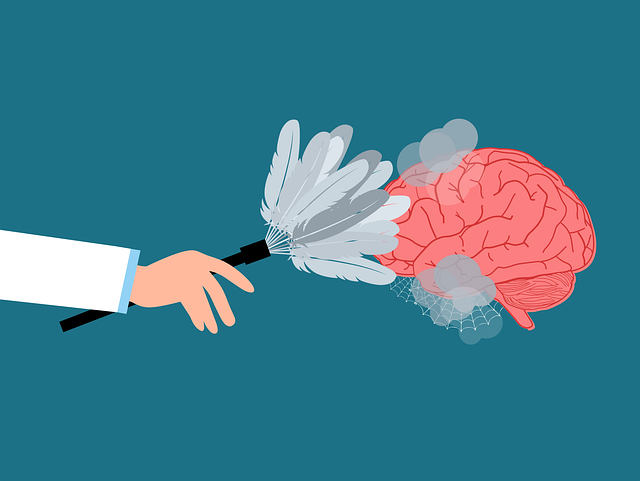Public awareness campaigns targeting workplace issues among young adults are crucial for addressing prevalent mental health challenges, focusing on education, practical tools like compassion cultivation, and cultural sensitivity in mental healthcare. These initiatives aim to empower individuals with coping mechanisms and resilience, leveraging Mind Over Matter principles to manage job stress effectively. By teaching conflict resolution, mindfulness meditation, and positive reinforcement, young adults gain skills to improve focus and enhance overall mental health, leading to better productivity and job satisfaction. Robust evaluation through surveys, focus groups, and interviews measures campaign impact, including knowledge gain, attitude shifts, and adoption of self-care practices, with a key focus on encouraging therapy for workplace issues and reducing mental illness stigma.
Public awareness campaigns play a pivotal role in addressing pressing issues faced by young adults in the workplace, with a particular focus on therapy for young adults’ workplace issues and job stress. These campaigns serve as powerful tools to educate, empower, and support this demographic. This article delves into the development and effectiveness of such initiatives, exploring strategies like tailored therapy sessions and comprehensive support networks. We also examine implementation methods and evaluation metrics to gauge the success and impact on young adults navigating career challenges.
- Understanding Public Awareness Campaigns: Their Role in Addressing Young Adult Workplace Issues
- Creating Effective Therapy and Support Strategies for Job Stress in Young Adults
- Implementation and Evaluation: Measuring Success and Impact on Target Audience
Understanding Public Awareness Campaigns: Their Role in Addressing Young Adult Workplace Issues

Public awareness campaigns play a pivotal role in addressing critical issues faced by young adults in the workplace. These initiatives aim to educate and guide individuals, particularly young adults, on managing job stress and fostering healthy work environments. By implementing such campaigns, organizations can help mitigate common workplace challenges that often lead to mental health concerns among this demographic.
Focusing on therapy for young adults’ workplace issues, these campaigns can promote essential coping mechanisms and resilience strategies. They can introduce practices like compassion cultivation, which has gained prominence in risk management planning for mental health professionals. Additionally, emphasizing cultural sensitivity in mental healthcare practice ensures that support is tailored to diverse populations, addressing unique stressors within specific communities.
Creating Effective Therapy and Support Strategies for Job Stress in Young Adults

Young adults facing job stress require tailored therapy and support strategies to navigate their workplace issues effectively. According to recent studies, integrating Mind Over Matter principles can significantly mitigate stress-related challenges. These principles encourage a proactive mindset, fostering resilience against workplace pressures. By teaching young adults conflict resolution techniques, they gain the skills needed to address issues constructively, enhancing their emotional well-being and professional satisfaction.
Emotional well-being promotion techniques play a crucial role in these strategies. Techniques such as mindfulness meditation and positive reinforcement help individuals manage stress, improve focus, and boost overall mental health. Implementing these therapeutic approaches ensures that young adults are equipped to handle job stresses, leading to improved productivity and job satisfaction in the long run.
Implementation and Evaluation: Measuring Success and Impact on Target Audience

The successful implementation of public awareness campaigns about mental health issues, such as workplace stress and job-related anxieties among young adults, heavily relies on thorough evaluation strategies. Measuring the campaign’s impact involves assessing both its reach and effectiveness in changing perceptions and behaviors. This process begins with establishing clear goals and objectives, aligning them with the target audience’s needs—in this case, young adults navigating career pressures.
Evaluation methods should include surveys, focus groups, and interviews to gauge knowledge gain, attitude shifts, and self-care practice adoption. By comparing pre- and post-campaign data, organizers can assess whether participants are more likely to seek therapy for workplace issues or demonstrate improved coping mechanisms. Additionally, measuring the campaign’s influence on reducing mental illness stigma through these methods ensures that the initiative fosters a more supportive environment where young adults feel encouraged to prioritize their mental well-being, including enrolling in relevant training like healthcare provider cultural competency programs.
Public awareness campaigns play a pivotal role in addressing critical issues faced by young adults in the workplace, particularly regarding job stress. By combining educational initiatives with tailored therapy and support strategies, these campaigns can significantly enhance the well-being of this demographic. Through effective implementation and evaluation, we can measure the success and impact on the target audience, ensuring that interventions are not only reaching but also benefitting young adults struggling with workplace challenges. Integrating these approaches fosters a healthier and more supportive work environment for this vital segment of the workforce.








